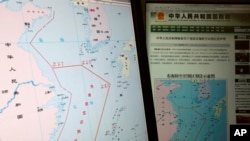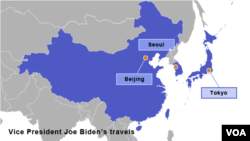BEIJING —
U.S. Vice President Joe Biden says that while Washington's relationship with Beijing is complex and the two countries have real differences, conflict is not inevitable. Biden made his those remarks Thursday on the last day of his stopover in Beijing on a three-nation tour to Asia.
Biden's trip to Asia has been overshadowed by concerns about China's recent establishment of an air defense identification zone over the East China Sea that includes territory also claimed by Japan.
China says the zone was established to safeguard the country's national security and that it will not affect freedom of aviation in the area. So far, China has not interfered with flights in the zone, but it has scrambled fighter jets to the area, heightening concerns about a possible miscalculation in the air.
The U.S., Japan, and South Korea have all sent military planes to the region in recent days, defying China's demand that they notify Beijing beforehand.
The zone was one of several key issues Biden discussed in more than five hours of meetings Wednesday with China's President Xi Jinping.
Although the vice president refrained from speaking out on the issue publicly prior to that meeting, he touched on it during an address Thursday to a group of business leaders in Beijing.
“China's recent and sudden announcement of the establishment of a new air defense identification zone has, to state the obvious, caused significant apprehension in the region. And I was very direct about our firm position and our expectations in my conversations with President Xi," he said.
Biden also noted that differences between the U.S. and China go far beyond security issues.
"We've had many disagreements, and some profound disagreements on some of those issues right now, the treatment of U.S. journalists, but I believe China will be stronger and more stable and more innovative if it respects universal human rights," he said.
Forging a new relationship
But, the vice president added that while the relationship is complex and differences real, conflict with China is not inevitable. He says that the United States and China are working to forge a new relationship between major powers that is defined by constructive cooperation.
“Wholesome competition and strong competition is fundamentally different than conflict. In fact, we see considerable common interest on the security side. A secure and peaceful Asia Pacific enables economic growth for the entire region," he said.
During his trip to Asia, Biden has been urging China to take steps to reduce tensions over the zone. On his first stop in Japan, he suggested establishing "confidence building measures, including emergency communications channels.”
When asked what China thought of Biden’s suggestions, however, a Foreign Ministry spokesman noted Thursday that during meetings with Chinese leaders both countries agreed that they should enhance dialogue and communication. The spokesman urged Washington to respect China’s establishment of the zone, which it says was done in line with international laws and conventions.
After visiting China, Biden travels next to South Korea, which has also expressed reservations about the ADIZ. Seoul is the last stop on his Asian tour.
Biden's trip to Asia has been overshadowed by concerns about China's recent establishment of an air defense identification zone over the East China Sea that includes territory also claimed by Japan.
China says the zone was established to safeguard the country's national security and that it will not affect freedom of aviation in the area. So far, China has not interfered with flights in the zone, but it has scrambled fighter jets to the area, heightening concerns about a possible miscalculation in the air.
The U.S., Japan, and South Korea have all sent military planes to the region in recent days, defying China's demand that they notify Beijing beforehand.
The zone was one of several key issues Biden discussed in more than five hours of meetings Wednesday with China's President Xi Jinping.
Although the vice president refrained from speaking out on the issue publicly prior to that meeting, he touched on it during an address Thursday to a group of business leaders in Beijing.
“China's recent and sudden announcement of the establishment of a new air defense identification zone has, to state the obvious, caused significant apprehension in the region. And I was very direct about our firm position and our expectations in my conversations with President Xi," he said.
Biden also noted that differences between the U.S. and China go far beyond security issues.
"We've had many disagreements, and some profound disagreements on some of those issues right now, the treatment of U.S. journalists, but I believe China will be stronger and more stable and more innovative if it respects universal human rights," he said.
Forging a new relationship
But, the vice president added that while the relationship is complex and differences real, conflict with China is not inevitable. He says that the United States and China are working to forge a new relationship between major powers that is defined by constructive cooperation.
“Wholesome competition and strong competition is fundamentally different than conflict. In fact, we see considerable common interest on the security side. A secure and peaceful Asia Pacific enables economic growth for the entire region," he said.
During his trip to Asia, Biden has been urging China to take steps to reduce tensions over the zone. On his first stop in Japan, he suggested establishing "confidence building measures, including emergency communications channels.”
When asked what China thought of Biden’s suggestions, however, a Foreign Ministry spokesman noted Thursday that during meetings with Chinese leaders both countries agreed that they should enhance dialogue and communication. The spokesman urged Washington to respect China’s establishment of the zone, which it says was done in line with international laws and conventions.
After visiting China, Biden travels next to South Korea, which has also expressed reservations about the ADIZ. Seoul is the last stop on his Asian tour.






